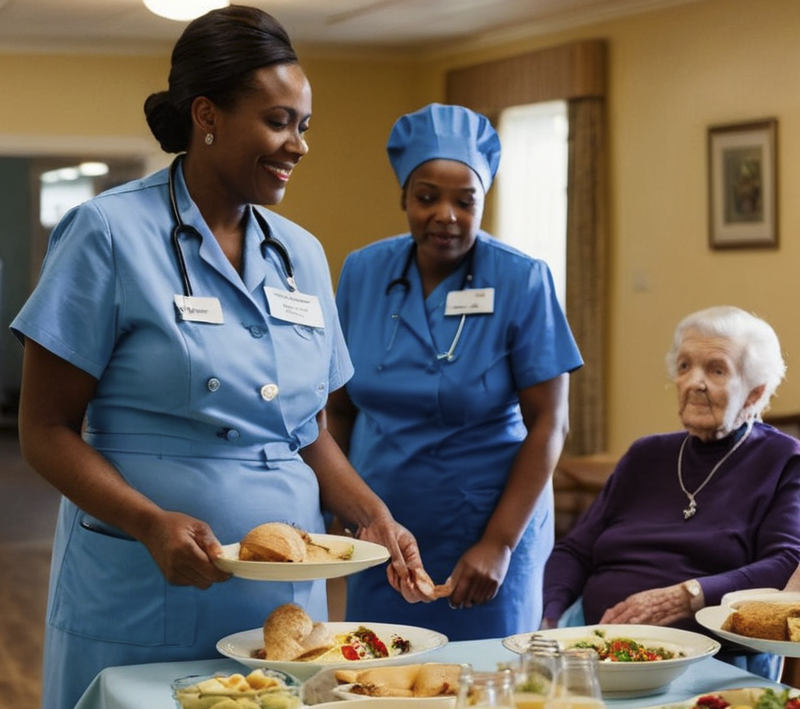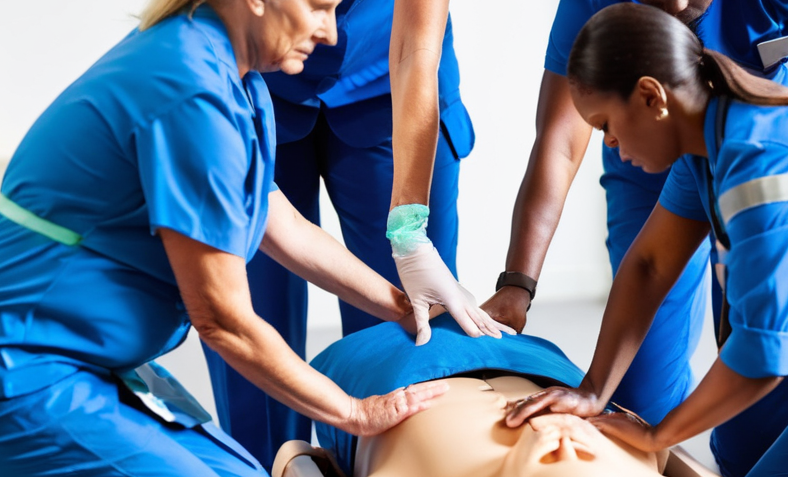Courses-Mandatory, Clinical & Specialist
Click a course for information about content and suitability
CSTF Full-Day Mandatory
Our CSTF (All in One Day) Mandatory Training is an essential yearly refresher course designed for all healthcare professionals, including part-time, full-time, and agency workers. This comprehensive course aligns with the UK Core Skills Training Framework (CSTF), meeting all major framework training requirements.
COURSE OVERVIEW
- Infection Prevention & Control Levels 1 and 2
- Information Governance & Data Security – Inclusive of Counter Fraud + GDPR
- Health & Safety, Fire Safety and Welfare
- Equality, Diversity & Human Rights
- Preventing Radicalisation
- Conflict Resolution – Inclusive of Complaints Handling + Lone Working
- Safeguarding Adults Level 1 and 2 – Including Mental Capacity Act
- Safeguarding Children Level 1 and 2
- Moving & Handling Level 1 and 2
- Resuscitation Level 1 – Inclusive of Anaphylaxis
- Resuscitation Level 2 – Adult Basic Life Support
- Resuscitation Level 3 – Adult Immediate Life Support
WHO IS THIS COURSE FOR?
The CSTF (All in One Day) Mandatory Training is an annual refresher designed for all healthcare professionals, including part-time, full-time, and agency workers.
Aligned with the Core Skills Training Framework (CSTF), this course satisfies all major Framework training requirements.
HOW TO BOOK
If you need to arrange training for your staff please BOOK HERE. This course can be provided at your place of work.
Important Note: This Mandatory and Statutory Training is intended as a refresher course and is suitable for individuals with prior healthcare experience, including care workers. For new care workers please see the care certificate course.
Practical Day Course Content (Required Annually): This classroom-based training day covers essential practical elements, including Manual Handling and Resuscitation.
Free Optional E-learning Courses: This course includes optional e-learning courses such as: food hygiene, tissue viability, medicine awareness and physical restraint awareness.
Requirements:
- Delegates must be 18 years or older.
- A basic command of English (Level 2) is required. We can offer limited support for non-native English speakers, and special arrangements can be made if requested in advance. Please contact us for further guidance.

Emergency First Aid at Work
Under the Health and Safety (First-Aid) Regulations 1981, employers are required to provide adequate and appropriate first aid equipment, facilities, and personnel. This course provides life-saving first aid skills and knowledge of workplace health and safety regulations. The course equips you with the necessary knowledge to identify emergency situations and respond appropriately. It covers first aid treatment for infants, children, and adults.
COURSE OVERVIEW
- Adult resuscitation (CPR)
- Burns and scalds
- Choking adult
- Communication and casualty care
- Defibrillator prompts and how to respond (theory-based)
- Defibrillator pad placement (theory-based)
- Minor and severe bleeding
- Role of the first aider
- Seizures
- Shock
- Unresponsive adult
If you need to arrange training for your staff please BOOK HERE. This course can be provided at your place of work.
WHO IS THIS COURSE FOR?
This course is ideal for individuals seeking training in emergency first aid, particularly those designated as first aiders. Businesses that are required by law to have appointed first aiders should choose this course. The training focuses on first aid protocols for emergency situations.
DURATION
Full day
Requirements:
- Delegates must be 18 years or older.
- A basic command of English (Level 2) is required. We can offer limited support for non-native English speakers, and special arrangements can be made if requested in advance. Please contact us for further guidance.

Medication Administration
Avoidable medication errors result in 1,700 deaths and cost the NHS in England over £98 million annually. Furthermore, there are more than 230 million medication errors made every year, many of which are preventable.
While medication can be hazardous when misused, it is an extremely effective tool for alleviating symptoms and improving or prolonging a person’s life when used correctly.
Healthcare professionals are responsible not only for the safe administration of medication but also for upholding the dignity of patients, promoting their independence, and respecting their choices.
COURSE OVERVIEW
- Relevant legislation
- Rights of medication administration
- Types and classifications of medication
- Routes into the body
- Record-keeping practices
- Prescribing procedures
- Types and causes of medication errors
- Proper storage and disposal of medication
- Buccal medication administration
- Promoting self-administration and independence
- Contraindications, allergies, and overdose management
- Monitoring and managing dosage systems
- Performing medication calculations
WHO IS THIS COURSE FOR?
Medication Administration training serves as an excellent refresher for healthcare professionals responsible for receiving, storing, administering, and disposing of medication.
HOW TO BOOK
If you need to arrange training for your staff please BOOK HERE. This course can be provided at your place of work.
DURATION
Full day-For new staff
Half day-For current staff, as a refresher
Requirements:
- Delegates must be 18 years or older.
- A basic command of English (Level 2) is required. We can offer limited support for non-native English speakers, and special arrangements can be made if requested in advance. Please contact us for further guidance

Moving & Handling Of People
Incorrect or controversial people moving and handling techniques can cause serious injuries to both you and the people you support. Update your knowledge and skills with this comprehensive training course to protect yourself and the people you support from accidents, injury or discomfort.
Instructors will customise the training to meet workplace and participants’ needs.
COURSE OVERVIEW
- Introduction to Manual Handling & Legislation
- Risk Assessment
- Ergonomics and Body Mechanics
- Practical Techniques for Manual Handling
- Moving and Assisting People
- Bed Manoeuvres & repositioning-including slide sheets
- Sitting to standing
- Assisted walking
- Falls Awareness
- Use of Hoists
- Equipment Use and Maintenance
- Communication and Independence
- Practical Assessment
WHO IS THIS COURSE FOR?
Any staff who are involved in the Moving and Handling of People.
HOW TO BOOK
If you need to arrange training for your staff please BOOK HERE. This course can be provided at your place of work.
DURATION
Full day-For new staff.
Half day-For current staff, as a refresher.
Requirements:
- Delegates must be 18 years or older.
- A basic command of English (Level 2) is required. We can offer limited support for non-native English speakers, and special arrangements can be made if requested in advance. Please contact us for further guidance.

Safeguarding
There were approximately 587,970 adult safeguarding concerns raised during the 2022-2023 period in the UK. This marks a 9% increase from the previous year. Additionally, there were about 173,280 Section 42 enquiries initiated, which is a 7% increase from the prior year, involving 136,865 individuals. Services and their staff are required to understand their responsibilities regarding reporting, abuse, and procedures.
Instructors will customise the training to the needs of the service. Safeguarding adults and safeguarding children courses, including a combined session are available.
COURSE OVERVIEW
- Roles & Responsibilities
- Legislation and Guidelines-including the Care Act 2014
- Types of Abuse and Neglect
- Signs & Indicators
- Risk Assessment
- Reporting and Responding
- Effective Communication
- Case Studies and Scenarios
- Documentation and Record-Keeping
- Understanding the Responsibilities of Local Authorities
WHO IS THIS COURSE FOR?
Any staff who are involved in the Moving and Handling of People.
HOW TO BOOK
If you need to arrange training for your staff please BOOK HERE. This course can be provided at your place of work.
DURATION
Full day-For Safeguarding leads.
Half day-For all other staff.
Courses adapted on request to the client’s requirements.
Requirements:
- Delegates must be 18 years or older.
- A basic command of English (Level 2) is required. We can offer limited support for non-native English speakers, and special arrangements can be made if requested in advance. Please contact us for further guidance.

Health & Safety
Last year there were 60,645 non-fatal injuries reported by employers in the Health and Social Care sector (Health and Safety Executive-HSE). This represents part of a broader trend where our sector experiences a significant number of workplace injuries each year. These statistics highlight the ongoing challenges in maintaining safety in environments where employees frequently assist people they support and perform physically demanding tasks. The rate of non-fatal injuries in Health & Social Care was 1,780 per 100,000 workers, which is above the average across all industries.
Instructors will customise the training to the needs of the service.
CONTENT OVERVIEW
- Importance of health and safety in health and social care settings
- Legal responsibilities and regulations
- Risk Assessment-Hazards & Risks
- Infection Prevention and Control
- Manual Handling Techniques
- Fire Safety
- First Aid and Emergency Procedures
- Use of Personal Protective Equipment (PPE)
- Health and Well-being of Staff
- Reporting and Recording Incidents
- Creating a Safety Culture
WHO IS THIS COURSE FOR?
Any staff who work in Health & Social Care as part of their mandatory training.
HOW TO BOOK
If you need to arrange training for your staff please BOOK HERE. This course can be provided at your place of work.
DURATION
Half day- 3 Hours
Courses adapted on request to the client’s requirements.
Requirements:
- Delegates must be 18 years or older.
- A basic command of English (Level 2) is required. We can offer limited support for non-native English speakers, and special arrangements can be made if requested in advance. Please contact us for further guidance.

Infection Control
Effective infection control practices are essential to protect both healthcare workers and the people they support from healthcare-associated infections (HCAIs). HCAIs contribute to increased morbidity and mortality rates and put a significant financial strain on the NHS and other healthcare services. Many infections can be prevented by appropriate knowledge and training on how to control and prevent transmission.
Instructors will customise the training to the needs of the workplace.
COURSE OVERVIEW
- Importance of Infection Control
- Legal and Regulatory Frameworks
- Understanding Microorganisms & Routes of Transmission
- Principles of Infection Prevention and Control
- Cleaning and Decontamination
- Risk Assessment and Management
- Handling and Disposal of Waste
- Outbreak Management
- Educating People you Support
- Surveillance and Audits
- Emerging Issues and Best Practices
WHO IS THIS COURSE FOR?
Any staff who work in Health & Social Care as part of their mandatory training.
HOW TO BOOK
If you need to arrange training for your staff please BOOK HERE. This course can be provided at your place of work.
DURATION
Half day-For All Staff
Full day-For Infection Control Leads
Courses adapted on request to the client’s requirements.
Requirements:
- Delegates must be 18 years or older.
- A basic command of English (Level 2) is required. We can offer limited support for non-native English speakers, and special arrangements can be made if requested in advance. Please contact us for further guidance.

Food Hygiene
The Foods Standards Agency was notified of 2,038 food and feed safety incidents in England, Northern Ireland, and Wales during last year. This represents a 13% decrease when compared to the previous year, noting that training and an improvement in facilities contributing largely to the reduction. The vulnerability of the people who we support in Healthcare increases their risk; this course will help provide knowledge on Food Safety practices to reduce that risk.
Trainers will customise the training to the needs of the workplace.
COURSE OVERVIEW
- Importance of Food Hygiene in Health and Social Care Environments.
- Legal Requirements and Regulations Governing Food Safety
- Microbiology of Food Contamination
- Personal Hygiene and Health Requirements
- Safe Food Handling Practices
- Cleaning and Sanitising Procedures
- Allergen Management
- Pest Control
- Food Storage and Stock Rotation
- Food Safety Management Systems
- Role of Supervision and Training
WHO IS THIS COURSE FOR?
Any staff who handle or prepare food in Health & Social Care. Kitchen staff or those who prepare food on a regular basis will need a more extensive course, outlined below as a Full-day.
HOW TO BOOK
If you need to arrange training for your staff please BOOK HERE. This course can be provided at your place of work.
DURATION
Half day-For All Staff
Full day-For Staff who prepare and handle food more regularly
Courses adapted on request to the client’s requirements.
Requirements:
- Delegates must be 18 years or older.
- A basic command of English (Level 2) is required. We can offer limited support for non-native English speakers, and special arrangements can be made if requested in advance. Please contact us for further guidance.

Fire Warden/Marshal
Last year there were 592,996 fire related incidents with over 250 fatalities; of those fatalities more than 70% were vulnerable people. Healthcare providers are required to have trained Fire Wardens/Marshals by law. If you require further information on how many staff you need to train, get in touch HERE.
Trainers will customise the training to the needs of the workplace.
COURSE OVERVIEW
- Causes of Fires
- Fire Regulations & Laws
- Cost of Fire Damage
- Fire Detection & Warning
- Evacuation & Rescue
- Personal Emergency Evacuation Plans
- Firefighting Equipment-Including Fire Extinguishers
- Policies & Procedures
- Role of a Fire Warden/Marshal
WHO IS THIS COURSE FOR?
Staff who have been allocated the role of Fire Warden/Marshal within a health and social care setting. You can contact us regarding what your service may need HERE.
HOW TO BOOK
If you need to arrange training for your staff please BOOK HERE. This course can be provided at your place of work.
DURATION
Full day-For Staff who haven’t completed any previous training
Half day-For Staff who have completed previous training within the last year
Requirements:
- Delegates must be 18 years or older.
- A basic command of English (Level 2) is required. We can offer limited support for non-native English speakers, and special arrangements can be made if requested in advance. Please contact us for further guidance.

Care Home Assistant Practitioner
Support your Nurses with Care Home Assistant Practitioners (CHAP’s) training, helping your business bridge the gap between senior staff and nurses. When effectively implemented, the training alleviates pressure on the nursing team, enhancing the quality of care delivery. The CHAPS program normally spans ten consecutive weeks, featuring one in-person training day each week. This can be adapted to your workplace needs and dependant on the services requirements, courses can be added and/or removed. See the course content below as a guide for the program.
Throughout the course, participants will be taught various practical sessions and be required to meet competencies in order to pass the course.
If you require further information, get in touch HERE.
COURSE CONTENT GUIDE
Day 1-Leadership & Teamwork: The course starts with an introduction to CHAPs, focusing on developing key communication and leadership skills for effective teamwork and patient interactions.
Day 2-Basic Observations: Emphasis on clinical and basic observations, teaching essential patient monitoring and recording skills to gain competency.
Day 3-Medication Administration: Safer medication administration is the focus, where practical skills in safe handling, storage and recording of medication are taught.
Day 4-Care Planning & PCC: This course covers care planning and record keeping, along with handover and delegation techniques for maintaining quality care continuity.
Day 5-Pressure & Wound Care: Pressure area care and wound care are explored, crucial for ensuring patient comfort and promoting healing.
Day 6-PEG & Dysphagia: The course raises awareness about dysphagia and includes competency training in PEG feeding, equipment and cleaning; critical for patients with swallowing difficulties.
Day 7-Stoma Care & Catheterisation: You’ll learn about stoma care and catheterisation; essential for maintaining patient dignity and hygiene.
Day 8-Suctioning & Oxygen therapy: Focus on suction and oxygen management, important skills in various care settings.
Day 9-Venepuncture: Also known as Phlebotomy, is an essential skill for numerous medical procedures involved in taking blood.
Day 10-Diabetes, BGM & Insulin: Focusing on Blood Glucose Monitoring, Insulin injections and an overall understanding of the different types of Diabetes and their complications.
WHO IS THIS COURSE FOR?
Staff who have been selected as having the potential to assist and support Nurses in providing quality care. You can contact us regarding what your service may need HERE.
HOW TO BOOK
If you need to arrange training for your staff please BOOK HERE. This course can be provided at your place of work.
DURATION
Dependant on the businesses needs and operations.
Requirements:
- Care qualification (at least level 3).
- Motivation and ability to learn new concepts and clinical skills.
- Delegates must be 18 years or older.
- A basic command of English (Level 2) is required. We can offer limited support for non-native English speakers, and special arrangements can be made if requested in advance. Please contact us for further guidance.

Epilepsy with Buccal
This course will provide comprehensive knowledge about epilepsy and seizures, covering what is epilepsy, its causes, triggers, symptoms, and various treatment options. You will understand the impact of epilepsy on a person’s life, learning how to support those living with the condition. The course details appropriate responses to different types of seizures, administering rescue medication (buccal) and how assist in an emergency.
COURSE OVERVIEW
- Definition & Overview of Epilepsy
- Legislation and Legal Responsibilities
- Causes and Triggers
- Symptoms and Diagnosis
- Types of Seizures and their Characteristics.
- Impact on Development and Functioning
- Treatment & Medication
- Buccal Administration of Medication
- Emergency Response to Seizures
- Post-Seizure Care and Support
HOW TO BOOK
If you need to arrange training for your staff please BOOK HERE. This course can be provided at your place of work.
WHO IS THIS COURSE FOR?
Staff who work with people who have Epilepsy and suffer from seizures, needing to administer rescue medication. You can contact us regarding what your service may need HERE.
DURATION
Full day-For Staff who haven’t completed any previous training
Half day-For Staff who have completed previous training within the last year
Requirements:
- Delegates must be 18 years or older.
- A basic command of English (Level 2) is required. We can offer limited support for non-native English speakers, and special arrangements can be made if requested in advance. Please contact us for further guidance.

Positive Behaviour Support
Children, young people, and adults are entitled to support and services that foster capable environments, built on the principles of Positive Behavioural Support (PBS) and other evidence-based approaches. They are also entitled to receive care and support founded on current and robust evidence, ensuring timely access to therapies and PBS. This course will train staff to be able to better help and support people with behaviours of concern.
COURSE OVERVIEW
- Types of Behaviours of Concern
- Legislation & Laws
- Mental Capacity & DoLS
- Triggers & Causes
- Understanding the Reasons for Challenging Behaviours
- A Person’s Human Rights
- Hierarchy of Response
- Resolution of Conflict
- De-escalation
- Primary and Secondary Interventions
- Understanding Human Factors
- Fight, Flight, Freeze
- Behaviour Charts
WHO IS THIS COURSE FOR?
Staff who work in an environment where the people they support display behaviours that challenge. You can contact us regarding what your service may need HERE.
HOW TO BOOK
If you need to arrange training for your staff please BOOK HERE. This course can be provided at your place of work.
DURATION
Full day
Requirements:
- Delegates must be 18 years or older.
- A basic command of English (Level 2) is required. We can offer limited support for non-native English speakers, and special arrangements can be made if requested in advance. Please contact us for further guidance.

Why the HealthCare Academy?

Cost-effective
Exclusively using in-house trainers, allows us to provide budget-friendly skills to your staff.

Versatile
With our flexible and adaptable approach, we bespoke the course to your needs.

Inclusive
Students learn through various methods, at the HealthCare Academy we recognise this through interactive and engaging learning methods.

Mindful
We organise your training to reduce interference with your business operations.

